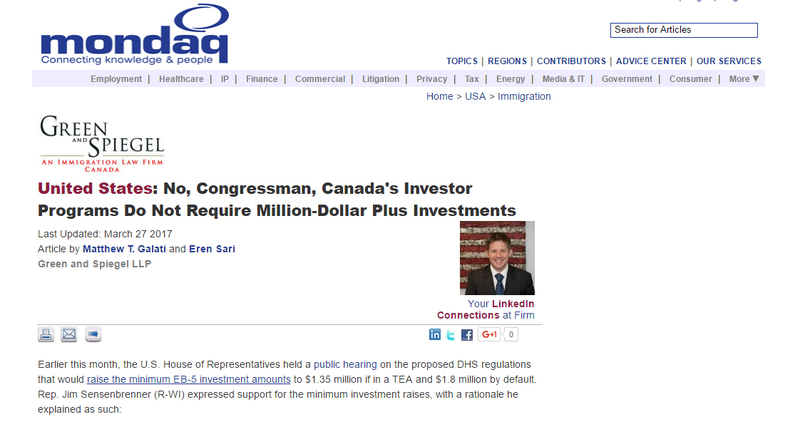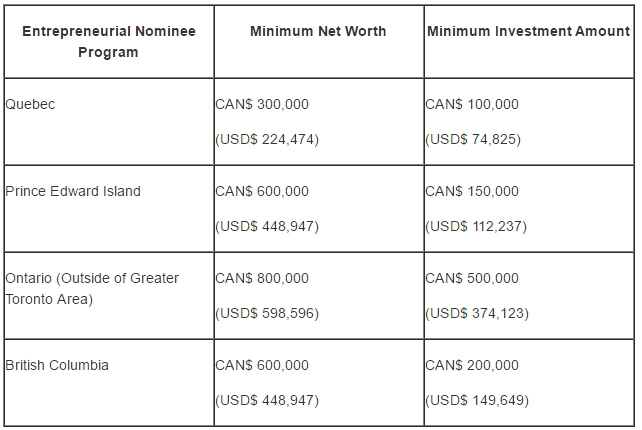United States: No, Congressman, Canada's Investor Programs Do Not Require Million-Dollar Plus Investments
Earlier this month, the U.S. House of Representatives held a public hearing on the proposed DHS regulations that would raise the minimum EB-5 investment amounts to $1.35 million if in a TEA and $1.8 million by default. Rep. Jim Sensenbrenner (R-WI) expressed support for the minimum investment raises, with a rationale he explained as such:
"Other nations that have investor visa programs require much larger investments. [...] Canada's program requires at least one and a half million U.S. dollars in addition to a required personal net worth of over 7 million or more U.S. dollars."
Wow, talk about an "alternative fact." That anecdote is nowhere near accurate.
It is critically important that Congress and DHS understand how competing immigrant investor programs operate prior to enacting any changes, as they may inadvertently price the U.S. out of the worldwide immigration-by-investment market. We've previously discussed how you can move to Canada as an investor or entrepreneur, but perhaps the points bear repeating.
The Former Federal Immigrant Investor Program (IIP)
Canada does not presently have a federal investor program at the Federal level (we're working to change that, by the way). In 2014, Citizenship and Immigration Canada terminated the previous IIP program. When it was active, the requirements were nowhere near as onerous as Sensenbrenner suggests: an investor had to evidence that he or she had business experience, possessed a net worth of at least CAN$1,600,000 that was gained legally, and invested CAN$800,000.
Notwithstanding the end of the IIP, immigration by investment is far from dead in the land of the Maple Leaf. Unlike the U.S. where immigration is almost always a strictly federal issue, Canada allows immigration by meeting provincial requirements. Most of the provinces have such programs.
The Quebec Immigrant Investor Program (QIIP)
The QIIP is most analogous to EB-5. Like its American cousin, immigrant investors make an investment that will finance domestic businesses. The QIIP is the only passive investment program in Canada. To qualify, investors need sufficient experience in management and an intent to settle in Quebec. Investors must sign an agreement with a financial intermediary (FI) that is authorized to participate in the program.
QIIP investors must hold net assets of at least CAN$1.6 million (USD $1,197,190) obtained legally. The program requires a minimum investment amount of CAN$800,000 (USD $598,596), which is arguably comparable to an EB-5 Regional Center investment when considering an administrative fee. If an investor chooses this option, the funds are returned, without interest, in 5 years.
But most investors (and most of our clients) choose another option known as "walkaway financing." In lieu of investing the full CAN$800,000, investors may obtain financing from the FI where they will receive no funds in return but instead pay a substantially lower amount. Although this is dictated by market forces, most investors can receive walkaway financing with about a CAN$220,000 investment (USD $164,614), subject to change due to prevailing interest rates. This option is favorable to immigrant investors with legitimate concerns about the opportunity costs of 1) investing the full amount, or 2) the comparable EB-5 requirement that at least $500,000 be sustained in the new commercial enterprise through conditional residency.
Accordingly, if DHS raises the minimum EB-5 investment amount so substantially, many prospective U.S. investors will likely choose substitutes such as the QIIP, Portugal's Golden Visa (requiring only a EUR 500,000 real estate investment) or Grenada's citizenship-by-investment program which also allows one to seek an E-2 visa once the passport is issued. It is important that EB-5 policymakers and stakeholders understand that the idea that "other programs are more expensive" is not an accurate premise to justify such a drastic raise in minimum investment amounts.
Other Provincial Nominee Programs (PNP)
In addition to Quebec itself, several other offer entrepreneurial programs that will grant residency to investors. Unlike the QIIP, these such programs require active management. Entrepreneurial-minded foreign nationals interested a Direct EB-5 investment might choose a Canadian PNP instead of the U.S. if the proposed regulation is enacted as discussed above.
Below is a chart describing the general financial aspects of the most popular programs chosen by our clients:
Each program does, however, have its nuances and investing more than the minimum amount may be necessary to secure a nomination.
Mentions
States
- New York
Videos





Subscribe for News
Site Digest
Join Professionals on EB5Projects.com →
Securities Disclaimer
This website is for informational purposes only and does not constitute an offer or solicitation to sell shares or securities. Any such offer or solicitation will be made only by means of an investment's confidential Offering Memorandum and in accordance with the terms of all applicable securities and other laws. This website does not constitute or form part of, and should not be construed as, any offer for sale or subscription of, or any invitation to offer to buy or subscribe for, any securities, nor should it or any part of it form the basis of, or be relied on in any connection with, any contract or commitment whatsoever. EB5Projects.com LLC and its affiliates expressly disclaim any and all responsibility for any direct or consequential loss or damage of any kind whatsoever arising directly or indirectly from: (i) reliance on any information contained in the website, (ii) any error, omission or inaccuracy in any such information or (iii) any action resulting therefrom.




